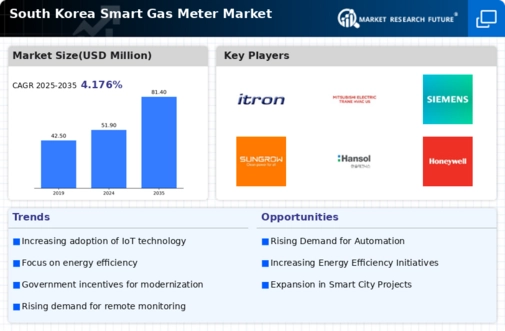The South Korea Smart Gas Meter Market has become increasingly competitive due to technological advances and the growing focus on energy efficiency and sustainable resource management. Smart gas meters, which facilitate the automatic collection of gas usage data, have gained traction as utility companies and consumers seek more accurate billing, enhanced monitoring capabilities, and better energy management solutions. This dynamic landscape is characterized by several local and international players vying for market share, focusing on innovations, regulatory compliance, and energy-saving technologies. With government initiatives aimed at promoting digitalization and the implementation of smart systems, companies operating within this market are continuously adapting their strategies to meet the evolving needs of the industry and consumers alike.Itron has established a notable presence in the South Korea smart gas meter market, leveraging its expertise in advanced metering infrastructure and smart grid technologies. The company's strength lies in its innovative solutions that enhance the efficiency and functionality of gas meters, thereby providing utility companies with improved data analytics capabilities and operational efficiency. Itron's commitment to sustainability further resonates with South Korea's energy policies, which prioritize environmentally friendly practices and smart city initiatives. With a solid reputation for reliability and technological advancements, Itron is well-positioned to capitalize on the growing demand for smart utility solutions and data-driven applications in South Korea.Daewoo Engineering and Construction has carved out a significant niche in the South Korea smart gas meter market, contributing to the advancement of infrastructure and smart technology applications. The company offers a range of products and services, including the development and integration of smart gas metering systems aimed at enhancing measurement accuracy and operational efficiencies. With a strong focus on engineering excellence and innovation, Daewoo Engineering and Construction has developed strategic partnerships and pursued mergers and acquisitions to strengthen its market presence and expand its service offerings. The company's strengths include comprehensive project management capabilities and the ability to deliver integrated smart solutions that align with South Korea's utilities' modernization efforts. Through these initiatives, Daewoo Engineering and Construction continues to play a pivotal role in driving smart gas metering advancements in the region.



















